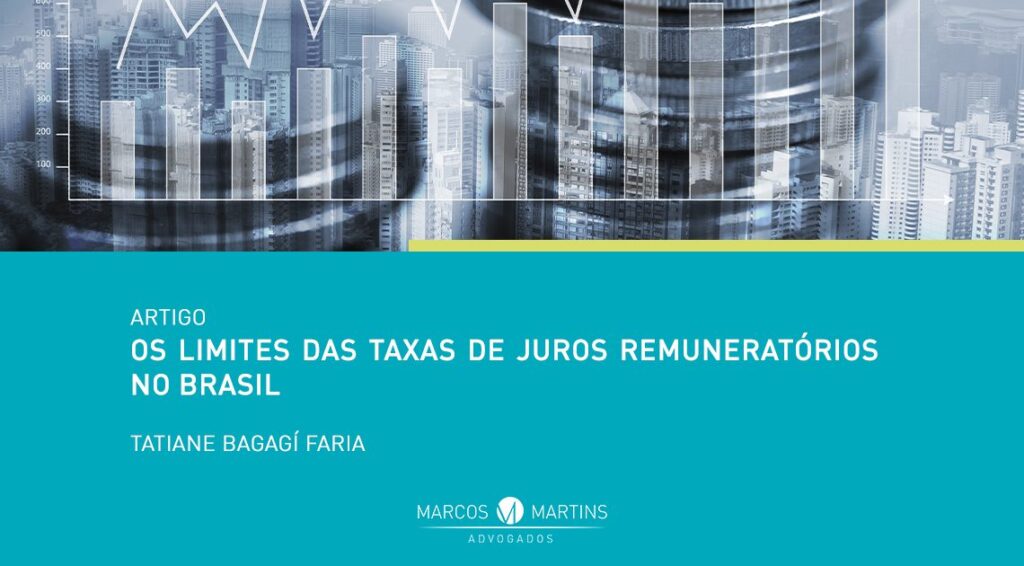Tatiane Bagagí Faria
Lawyer at Marcos Martins Advogados
The analysis of the application of legal rules involving the charging of remunerative interest in the contractual sphere is a subject of much discussion by law enforcers, especially with regard to the limit on contracted interest rates.
Remunerative interest arises from the loan of capital and serves, as its name makes clear, as a form of remuneration to the creditor who has made a certain amount available, for a certain period of time, to be used by the debtor. Such interest can be conventional, i.e. contractually established between the parties involved, or legal, which derives from the provisions of the law. Remuneration interest does not arise from the debtor’s default, so it cannot be confused with interest on arrears. There is therefore no impediment to the cumulation of both types of interest on a given obligation.
Decree 22.626 of April 7, 1933, known as the Usury Law, expressly forbade the setting of interest rates higher than twice the legal rate.
In turn, the Civil Code of 2002 established that interest, when not agreed between the parties, should be fixed in accordance with the rate in force for the payment of taxes by the National Treasury. In verbis:
Art. 406. When interest on arrears is not agreed, or is not stipulated, or is determined by law, it shall be fixed at the rate in force for late payment of taxes owed to the National Treasury.
Art. 591 – If the loan is for economic purposes, interest is presumed to be due, which, under penalty of reduction, may not exceed the rate referred to in art. 406, with annual capitalization permitted.
There has been much discussion about the interest rate for late payment of taxes owed to the National Treasury, since it was understood that the limit of 12% per year set out in §3 of art. 192 of the Constitution would depend on regulation, a provision that was eventually repealed by Constitutional Amendment 40/2003. Case law eventually prevailed in favor of applying the limit set out in Article 161, §1 of the National Tax Code[1] to civil debts, i.e. interest of 1% per month (12% per year).
Financial institutions
In another direction, the Superior Court of Justice has settled case law on the subject in relation to financial/banking institutions subject to the National Financial System not being subject to the limitation on remunerative interest provided for by law.
In this regard, Precedent 596 of the Federal Supreme Court was issued:
Precedent 596: The provisions of Decree 22.626 of 1933 do not apply to interest rates and other charges levied in operations carried out by public or private institutions, which are part of the National Financial System.
With this understanding, it can be concluded that, in loan agreements signed with banks, the remunerative interest contracted is not limited to the rate of 12% per year, as in civil debts.
However, the Judiciary itself has established the understanding that, even without being subject to the 12% per annum limit, the remunerative interest contracted with financial institutions, within the scope of the National Financial System, cannot be substantially higher than the average market interest rate practiced for credit operations of the same nature and in the same period.
Therefore, if there is proof that the interest rates charged by financial institutions are higher than the market average, it is possible for the Judiciary to intervene in order to review the interest rate of the loan contracted in the specific case, in the light of provisions that prevent excessive profit (art. 173, §4, of the CF/88) and provisions of the Consumer Protection Code.
There has thus been a relaxation in the application of the understanding summarized by the STF in order to allow for fairness in banking contracts, in order to avoid undue enrichment through abusive interest rates that lead to excessive profits to the detriment of borrowers, especially those who are in a position of need.
Against the backdrop of the Covid-19 pandemic
For this reason, and considering the current financial and economic situation aggravated by the Covid-19 pandemic, it is essential that the Judiciary act to redress the contractual imbalance in bank loan operations, maintaining the legal transactions entered into, but correcting the excesses, in order to bring to light the applicability of basic principles of the contractual order and also the legal certainty necessary for the regular development and functioning of the markets.
Marcos Martins Advogados is attentive to this issue and is ready to assist you, whether in the collection of unpaid loans or in requests for contractual review of interest that appears to be abusive.
[rock-convert-pdf id=”15265″]
[1] “Art. 161. Any debt not paid in full on the due date shall be subject to default interest, regardless of the reason for the default, without prejudice to the imposition of the applicable penalties and the application of any guarantee measures provided for in this Law or in tax law.
§ 1 If the law does not provide otherwise, interest on arrears shall be calculated at the rate of one percent per month.”








